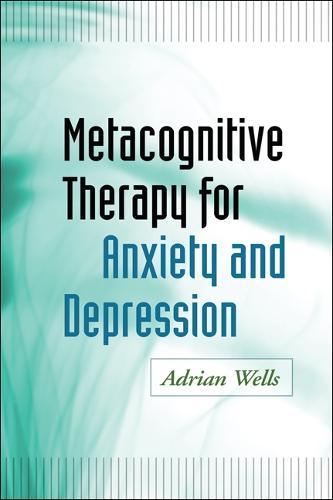Overview
This groundbreaking book explains the ""whats"" and ""how-tos"" of metacognitive therapy (MCT), an innovative form of cognitive-behavioral therapy with a growing empirical evidence base. MCT developer Adrian Wells shows that much psychological distress results from how a person responds to negative thoughts and beliefs -- for example, by ruminating or worrying -- rather than the content of those thoughts. He presents practical techniques and specific protocols for addressing metacognitive processes to effectively treat Generalized Anxiety Disorder, Obsessive-Compulsive Disorder, Posttraumatic Stress Disorder, and major Depression. Special features include reproducible treatment plans and assessment and case formulation tools, plus a wealth of illustrative case material.
Full Product Details
Author: Adrian Wells (University of Manchester, United Kingdom) ,
Steven D. Hollon ,
Robert L. Leahy ,
Monica Ramirez Basco
Publisher: Guilford Publications
Imprint: Guilford Publications
Dimensions:
Width: 15.20cm
, Height: 2.30cm
, Length: 22.90cm
Weight: 0.463kg
ISBN: 9781609184964
ISBN 10: 1609184963
Pages: 316
Publication Date: 13 May 2011
Audience:
Professional and scholarly
,
College/higher education
,
Professional & Vocational
,
Tertiary & Higher Education
Format: Paperback
Publisher's Status: Active
Availability: Available To Order

We have confirmation that this item is in stock with the supplier. It will be ordered in for you and dispatched immediately.
Reviews
The procedures Wells describes will be enormously useful to therapists of all persuasions, and can form the bedrock of low-intensity and high-intensity interventions for a wide range of disorders. - Chris R. Brewin, University College London, UK As a clinician who has struggled with helping people work through dysfunctional thinking patterns, I can appreciate the usefulness of Wells's methods. Metacognitive Therapy (MCT) helps both the patient and the therapist take a step back from the sometimes repetitive work of cognitive therapy, and lends a new perspective with the potential for breaking through treatment roadblocks. Well done! - Monica Ramirez Basco, University of Texas at Arlington, USA This book presents a new and innovative approach that focuses on how patients think, as much as what they believe. It is firmly grounded in basic science and packed full of powerful clinical strategies... Should prove to be a valuable tool for graduate training across the professional disciplines. - Steven D. Hollon, Vanderbilt University, Tennessee, USA Clinicians who read this revolutionary book will be able to utilize techniques found nowhere else. - Robert L. Leahy, New York Presbyterian Hospital, USA MCT is a new and novel treatment and an exciting addition to the third wave of behavior therapy... Therapists trained in more traditional CBT will undoubtedly be very interested in how some of the MCT techniques might work with their current patients who are seemingly 'stuck.' - PsycCRITIQUES
The procedures Wells describes will be enormously useful to therapists of all persuasions, and can form the bedrock of low-intensity and high-intensity interventions for a wide range of disorders. - Chris R. Brewin, University College London, UK As a clinician who has struggled with helping people work through dysfunctional thinking patterns, I can appreciate the usefulness of Wells's methods. Metacognitive therapy (MCT) helps both the patient and the therapist take a step back from the sometimes repetitive work of cognitive therapy, and lends a new perspective with the potential for breaking through treatment roadblocks. Well done! - Monica Ramirez Basco, University of Texas at Arlington, USA This book presents a new and innovative approach that focuses on how patients think, as much as what they believe. It is firmly grounded in basic science and packed full of powerful clinical strategies...Should prove to be a valuable tool for graduate training across the professional disciplines. - Steven D. Hollon, Vanderbilt University, USA Clinicians who read this revolutionary book will be able to utilize techniques found nowhere else. - Robert L. Leahy, Weill Cornell Medical College, New York Presbyterian Hospital, USA MCT is a new and novel treatment and an exciting addition to the third wave of behavior therapy...Therapists trained in more traditional CBT will undoubtedly be very interested in how some of the MCT techniques might work with their current patients who are seemingly 'stuck.' - PsycCRITIQUES
"""The procedures Wells describes will be enormously useful to therapists of all persuasions, and can form the bedrock of low-intensity and high-intensity interventions for a wide range of disorders."" - Chris R. Brewin, University College London, UK ""As a clinician who has struggled with helping people work through dysfunctional thinking patterns, I can appreciate the usefulness of Wells's methods. Metacognitive therapy (MCT) helps both the patient and the therapist take a step back from the sometimes repetitive work of cognitive therapy, and lends a new perspective with the potential for breaking through treatment roadblocks. Well done!"" - Monica Ramirez Basco, University of Texas at Arlington, USA ""This book presents a new and innovative approach that focuses on how patients think, as much as what they believe. It is firmly grounded in basic science and packed full of powerful clinical strategies...Should prove to be a valuable tool for graduate training across the professional disciplines."" - Steven D. Hollon, Vanderbilt University, USA ""Clinicians who read this revolutionary book will be able to utilize techniques found nowhere else."" - Robert L. Leahy, Weill Cornell Medical College, New York Presbyterian Hospital, USA ""MCT is a new and novel treatment and an exciting addition to the third wave of behavior therapy...Therapists trained in more traditional CBT will undoubtedly be very interested in how some of the MCT techniques might work with their current patients who are seemingly 'stuck.'"" - PsycCRITIQUES"
Author Information
Adrian Wells, PhD, Division of Clinical Psychology, The University of Manchester, United Kingdom




